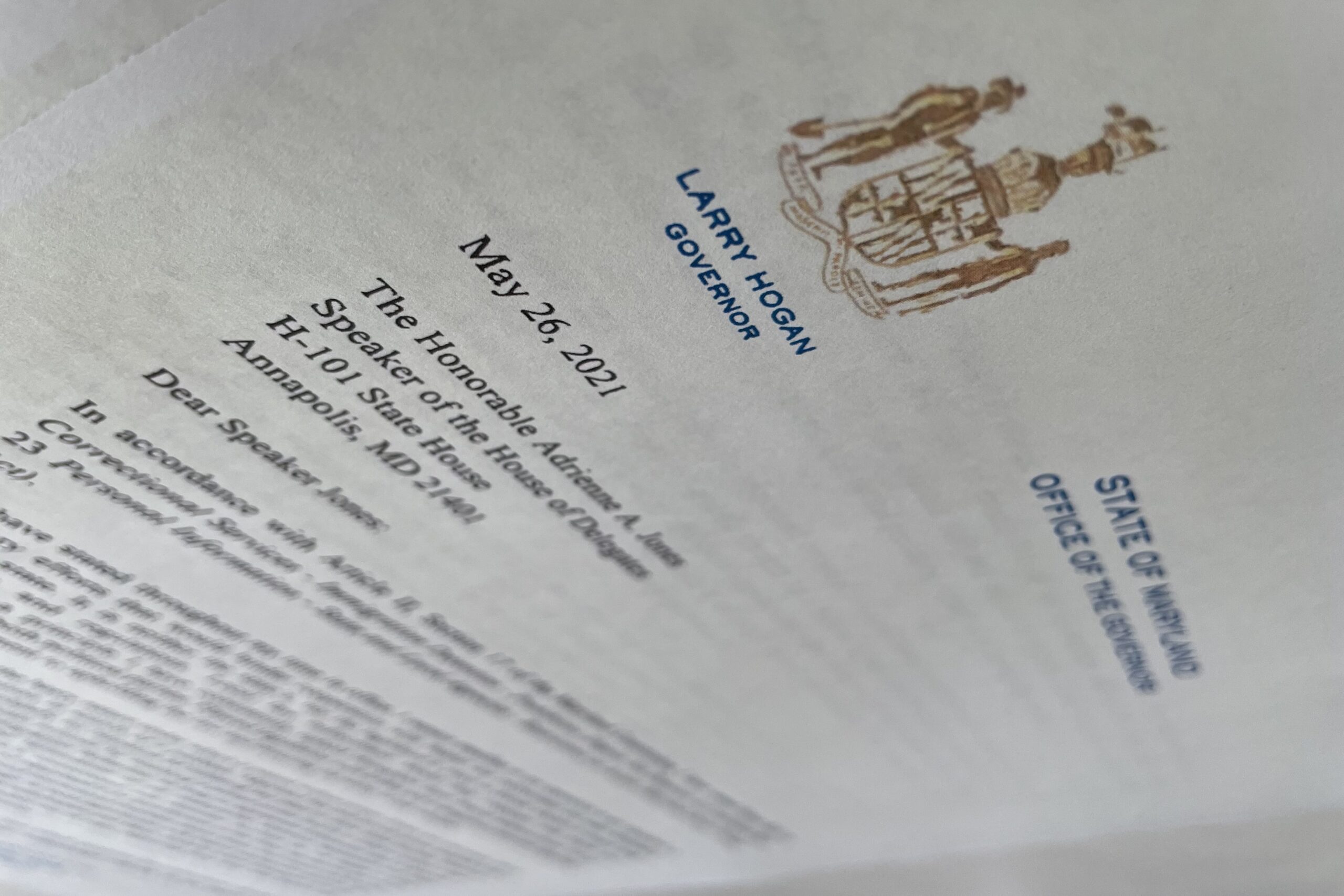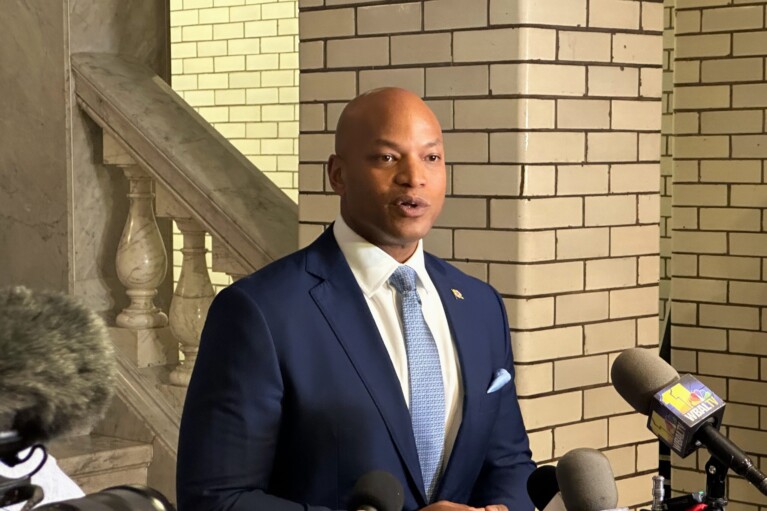
Gov. Lawrence J. Hogan Jr. (R) vetoed four bills on Wednesday, including a measure he called “sanctuary state” legislation.
That bill, House Bill 16, introduced by Del. Vaughn M. Stewart (D-Montgomery), would require counties that have agreements with Immigration and Customs Enforcement to jail detainees to end their contracts by Oct. 1, 2022.
In a veto message, Hogan said local law enforcement “should fully cooperate with federal law enforcement — a principle I have consistently upheld throughout three federal administrations led by presidents from both political parties. Flawed legislation such as this sets a dangerous precedent regarding the state’s commitment to upholding the law and ensuring the safety of our citizens.”
Two counties in the state have detention contracts with the federal immigration agency: Frederick and Worcester. The ICE contracts generate about $4 million in payments from the federal government for Worcester County — more than 40% of the jail’s annual budget —and about $1 million for Frederick County, according to legislative analysts.
As the legislation was being debated, Howard County Executive Calvin Ball (D) announced that his county would end an ICE contract by this month; officials announced on May 13 that the last immigration detainee had been transferred from the county.
The bill does not require counties to end 287 (g) agreements though which local jails conduct queries on the immigration status of people arrested and detain them for up to 48 hours on ICE’s behalf. Cecil, Frederick and Harford counties participate in that program. Those contracts may need to be updated if lawmakers override Hogan’s veto.
Hogan vetoed a second bill to limit cooperation with federal immigration authorities, House Bill 23, sponsored by House Environment and Transportation Committee Vice Chair Dana M. Stein (D-Baltimore County). That bill would require state employees to deny the inspection of facial recognition records or files containing photographs or other personal information for the purposes of civil immigration enforcement without a valid warrant.
Both bills passed the General Assembly by a veto-proof majority. Eighty-five votes are needed to override a veto in the House and 29 votes are needed for an override in the Senate. House Bill 16, called the Dignity not Detention Act by Democrats and advocates, passed with 86 votes in the House and 30 votes in the Senate.
Also vetoed on Wednesday were Senate Bill 420 and Senate Bill 202.
Hailed as a public health bill by advocates, SB 420, sponsored by Sen. Jill P. Carter (D-Baltimore City), would decriminalize certain drug paraphernalia, including hypodermic needles and syringes. The bill also reduces the maximum penalty for possession from four years in prison and a $25,000 fine to one year imprisonment and a $1,000 fine. Possession of paraphernalia with the intent to illegally manufacture or distribute drugs would still be illegal under the bill.
In a veto message, Hogan said the bill “completely erases the illegality of certain controlled dangerous substance paraphernalia by legalizing the delivery, sale, manufacturing, and possession of these dangerous and damaging items. This is an ill-advised policy change that does nothing to remove drug dealers from our streets or reduce opioid-related fatalities, and instead encourages the use and possession of paraphernalia associated with drug use.”
Senate Bill 420 passed the Senate without a veto-proof majority, 28-19.
Senate Bill 202, sponsored by Senate Finance Chairwoman Delores G. Kelley (D-Baltimore County), would remove the requirement that the governor approve parole recommendations sent to his desk by the Maryland Parole Commission.
People convicted of life sentences before Oct. 1, 2021, would become eligible for parole after serving 15 years in prison, or the equivalent with diminution credits. Those given life sentences after Oct. 1, 2021, would be required to serve the equivalent of at least 20 years.
In a veto message, Hogan said he agreed that people serving life sentences with the possibility of parole deserve meaningful consideration for release.
“I also recognize that each of the crimes that these individuals committed includes a victim and a family that had their lives forever altered by the actions of another,” Hogan wrote. “I have an obligation to ensure the safety of all Marylanders, and including the governor in the parole process provides an important check on the Maryland Parole Commission, especially since the individuals who are sent to me for consideration have committed truly horrendous crimes, including first degree murder, rape, and sexual assault.”
Maryland is one of three states to require its governor to approve parole recommendations before people serving life sentences can be released; advocates have argued that this unnecessarily brings politics into the decision-making process. In lieu of the governor’s signature on final parole decisions, the bill would require six of the 10 members of the Maryland Parole Commission to vote for parole.
Hogan is the first governor to sign off on a parole recommendation since the late William Donald Schaeffer (D).
Senate President Bill Ferguson (D-Baltimore City) issued a statement shortly after the vetoes were publicly announced Wednesday, accusing Hogan of siding with conservative Republicans. He employed a term Hogan often uses — “commonsense” — to describe the legislation the governor vetoed.
“For years, there has been bipartisan agreement that the current parole system is broken, the war on drugs is not working, and we are facing a broken immigration system. What is clear is that there are two visions of Maryland, one where we believe in the power of opportunity and one where we create fear and divisiveness with our neighbors,” Ferguson said. “Democrats and some Republicans in the General Assembly believe in the former, but it is sadly clear that Republicans, pulled by a hard right faction believe in the latter. I am disappointed to see the Governor veto these commonsense measures, and look forward to discussing these issues with members of the Senate and House Leadership before the Legislature reconvenes.”
House Majority Leader Eric G. Luedtke (D-Montgomery) said the vetoes were “disappointing, but not surprising.”
“I had some hope that Governor Hogan would distance himself from some of the worst habits of the Republican party,” Luedtke said. “And he hasn’t.”
While Luedtke said it was too early to comment about the timing of potential override votes, he added: “I think you’ll find that Democrats are pretty united in calling out how inappropriate these vetoes are.”
During the 2021 General Assembly session, the legislature overrode more than 40 bills vetoed by Hogan in 2020 and 2021.
Editor’s Note: This story was updated to include reaction from the House majority leader.





 Creative Commons Attribution
Creative Commons Attribution